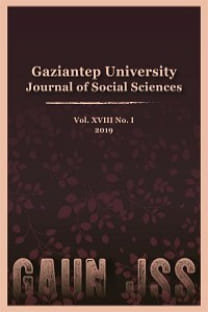Evelyn Waugh’un Bir Avuç Toz’unda Tony Last’ın Birey ve Toplumla Umutsuz Çarpışması
Evelyn Waugh’nun 1934 yılında yazdığı Bir Avuç Toz, başkahraman Tony Last’ın yirminci yüzyıl Londra’sındaki farklı sahnelerde mücadelesini konu alan yazarın dördüncü romanıdır. Bu romanda Waugh yirminci yüzyıl İngiliz toplumu ve bireyinin karanlık tarafını resmederken “insanın bencilliği ve kendini kandırması” fikrini açıkça ortaya koymaya çalışmıştır (Ward, 2008, p.679). Genel anlamda, yazar modern zamanın ve bireyin ruhunu etkisi altına alan yozlaşmayı ele alarak eleştirisini İngiliz toplumsal yaşamının farklı açılarına yöneltmiştir. Tony Last’ın evliliği, sosyal ilişkileri ve Brezilya’ya yaptığı seyahatine odaklanarak, Waugh geçmişe ve geleneklere değer veren masum Tony Last portresi çizmiştir. Ancak, böylesi bir toplumda yaşamında devam edebilmek amacıyla Tony kendini bulmak için girdiği mücadelelerde her seferinde mağlup olur. Bu sonuçsuz girişimleri resmetmek amacıyla da Waugh romana başkahramanın hüsranıyla biten iki farklı son yazar. Bireysel başarısızlıklar ve sosyo-kültürel yozlaşmadan ötürü roman, kişisel, kültürel ve sosyal tersliklerle çevrelenmiş Tony Last’ın savaşı ile ilgilidir. Bu bilgiler ışığında, bu çalışmada modernist bir tema olan bireyin arayışı Tony Last’ınki üzerinden incelenirken, Waugh’nun romanındaki modern zamanlar ve kişileri eleştirisi de tartışılmaktadır.
Anahtar Kelimeler:
Evelyn Waugh, Bir Avuç Toz, Modernist Roman, Arayış, Birey ve Toplum, Tony Last
The Doomed Struggle of Tony Last with the Society and the Individual in Evelyn Waugh’s A Handful of Dust
A Handful of Dust (1934), the fourth novel of Evelyn Waugh, deals with the struggles of the protagonist Tony Last in various stages of the twentieth century society. Waugh in this novel illustrates a dark picture of the twentieth century English society and its individuals with the aim of laying bare the “human selfishness and self-delusion” (Ward, 2008, p.679). In general sense, the author directs his criticism towards the various aspects of English social life indicating the pervading decadence in the soul of the individual and modern zeitgeist. Focusing on Tony Last’s, marriage, social relationships and expedition to Brazil, Waugh delineates a portrait of an innocent man who values the past and its traditions. Yet, in order to survive in the society Tony embarks on a quest for self-identity but fails in each attempt. So as to illustrate the futile attempts of Tony, Waugh writes two different endings for the novel both of which end in utter failures. Therefore, by the virtue of individual failures and socio-cultural corruption, the novel is concerned with the struggle of Tony Last who is surrounded by those individual, cultural and social adversities. In this study, the modernist theme of the quest of the individual will be analysed through Tony Last’s quest in social and personal spheres by also demonstrating the Waugh’s critique of the modern times.
Keywords:
Evelyn Waugh, A Handful of Dust, Modernist Novel, Quest, Individual vs Society,
___
- Referans1: Beaty, F. L. (1992). The ironic world of Evelyn Waugh: a study of eight novels. DeKalb: Northern Illinois UP.
- Referans2: Clement, A. (1994). The novels of Evelyn Waugh: a study in the quest-motif. New Delhi: Prestige.
- Referans3: Cunnigham, J. (1993). “A Handful of Dust” reconsidered. The Sewanee Review, 101(1),115-124. doi : 10.2307/27546667
- Referans4: Davis, R M. (2000). Introduction. A Handful of Dust. By Evelyn Waugh. London: Penguin.
- Referans5: Greenberg, J. (2003). “Was anyone hurt?”: the ends of satire in A Handful of Dust. NOVEL: A Forum on Fiction, 36(3), 351-373. doi: 10.2307/1346095
- Referans6: Heath, J. M. (1983). Picturesque prison: Evelyn Waugh and his writing. Kingston-Montreal: McGill-Queen's UP.
- Referans7: Littlewood, I. (1983). The writings of Evelyn Waugh. Oxford: Blackwell.
- Referans8: Lobb, E. (2003/2004) Waugh among the modernists: allusion and theme in A Handful of Dust.Connotations,13, 1-2, 130-43. Retrieved from http://www.connotations.de/wp-content/uploads/2017/07/lobb01312.pdf
- Referans9: Maloney, A. (2012). Bright young things: life in the roaring twenties. London: Virgin Books.
- Referans10: McCartney, G. (1987). Confused roaring: Evelyn Waugh and the modernist tradition. Bloomington: Indiana UP. Referans11: McDonnell, J. (1988). Macmillan modern novelists: Evelyn Waugh. Houndmills: Macmillan.
- Referans12: ---. (1985). Waugh on women. London: Gerald Duckworth & Co.
- Referans13: Nichols J. W. (1962) Romantic and realistic: the tone of Evelyn Waugh's early novels. College English, 24(1), 46-56. doi: 10.2307/373847
- Referans14: Sykes, C. (1975). Evelyn Waugh: a biography. London: Collins.
- Referans15: Ward, J. (2008) The waste sad time: Evelyn Waugh’s A Handful of Dust . English Studies, 89 (6), 679-695. doi: 10.1080/00138380802252909
- Referans16: Wasson, R. (1987). A Handful of Dust: critique of victorianism. J. F. Carens (Ed.), Critical essays on Evelyn Waugh, (133-43). Boston: G.K.Hal.
- Referans17: Waugh, Evelyn. (1934). A Handful of Dust. London: Penguin.
- Referans18: Worner, T. (2016). Christianity or chaos: the life-changing choice of Evelyn Waugh. Date of Access: 31.07.2018, https://aleteia.org/2016/08/22/christianity-or-chaos-the-life-changing-choice-of-evelyn-waugh/
- ISSN: 1303-0094
- Yayın Aralığı: Yılda 4 Sayı
- Başlangıç: 1991
- Yayıncı: Gaziantep Üniv. Sosyal Bilimler Enst.
Sayıdaki Diğer Makaleler
Basın Fotoğrafında Merhametin İyiliği ve Kötülüğü Üzerine
Parlamento Dışı Muhalefet Örneği Olarak Siyasi Kadın Hareketleri: Dünyadan ve Türkiye’den Örnekler
Avrupa Borç Krizi Çerçevesinde Cesareti Kırılmış İşçi Etkisi ve İlave-İşçi Etkisi
Tedarikçi Kalite Yönetiminin Performans Üzerindeki Etkisinin Yapısal Eşitlik Modeli İle Analizi
KÜRESEL ENERJİ JEOPOLİTİĞİNDE BALKANLARIN EKONOMİ POLİTİĞİ ÜZERİNE BİR DEĞERLENDİRME
E7 Ülkelerinde Finansal Derinleşme ve Yoksulluk İlişkisi: Bootstrap Panel Nedensellik Analizi
Türkiye’de Medikal Turizm İncelemesi: Özel Hastanelerde Bir Çalışma
Reich, Deleuze & Guattari ve Lyotard’ın Arzu Anlayışlarından Hareketle Kapitalizm ve Arzu İlişkisi
